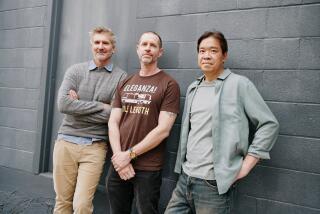Entrepreneur’s Saga Mirrors Rise of Capitalism in China
- Share via
SHANGHAI — SHANGHAI -- At 27, Shi Yuzhu used his life savings of $500 to start a software empire that he appropriately named Giant. His success seemed so unstoppable people called him China’s Bill Gates.
But his believers were less charitable when Shi’s multimillion-dollar company collapsed, earning the whiz kid and CEO the dubious honor of being one of China’s biggest failures.
Five years after he skipped town with a ruined reputation and a monstrous debt, the one-time business titan wants to become China’s Comeback Kid. Yet try as he might to resurrect his good name with a new product and new game plan, Shi’s ambitions seem doomed to live in the unforgiving shadow of his colossal flop.
“Chinese people don’t tolerate failure too well,” said the chain-smoking Shi, now 40, in a rare interview from the 26th floor corner office of his new health tonics business in a relatively low-key section of downtown Shanghai.
The spectacular rise and fall of private enterprises in China is part of the economic revolution giving the world’s largest remaining communist country a capitalist makeover.
The lessons are elementary, yet profound: A robust economy requires that entrepreneurs be willing to take a risk. That means businesspeople will have to change their traditional view and accept that it is healthy to let more businesses fail, leaving better ones to prosper and weaker ones to mend their ways.
“One of the big problems of the old socialist economy is companies could not fail,” said Ross Garnaut, the former Australian ambassador to China now teaching at The Australian National University. “If only state-owned enterprises were allowed to fail 10 years ago, they would be a lot healthier now.”
Most Chinese people still remember the days when private businesses were illegal and proletarians marched property owners wearing dunce caps down the street because they were class enemies. Despite Beijing’s decision last fall to allow owners of private enterprises into the Communist Party, China’s Red capitalists still wrestle with minimal government support and a minefield of arbitrary rules and regulations that treat them as second-class citizens.
Stacked Deck
The deck is stacked in favor of ailing state-owned enterprises.
Some 90% of firms raising capital in the Chinese stock market are state-owned. About 70% of those receiving bank loans are also run by the government, even though many are technically insolvent and could never repay their debts.
Yet against the odds, Chinese entrepreneurs have proved their worth. One study showed that in 2000, about 99% of the new businesses were private. They contributed about 60% of China’s total output and export volume and employed 75% of the workforce.
As China begins its second year as a member of the World Trade Organization, more wrenching changes are expected for the aging state dinosaurs, putting added pressure on the private sector to generate needed jobs and grow the economy.
“Westerners used a couple of hundred years to practice and perfect capitalism. We have just come to accept it as a system worth emulating,” said Mao Yushi, who runs a private economics research center in Beijing. “In terms of experience, we have only graduated from kindergarten.”
Eager to seize the opportunity, many Chinese entrepreneurs started to run before they learned to walk. Add irrational exuberance, limited know-how and inhospitable market conditions and you have the making of a Titanic business model.
Shi was one of those budding capitalists but hardly the only one.
There was the small-time liquor maker Qinqi, which shot to fame in 1996 by bidding an outlandish $39 million for the prime time ad slot trailing CCTV’s evening news. This amount was more than six times the company’s annual revenue and $12 million more than the second-highest bidder.
There was no science behind the shocking price tag, only the owner’s cell phone number. He thought it would bring him luck.
It did, in the form of more purchase orders. Unfortunately, the small enterprise couldn’t handle the demand, so it bought cheap wine and repackaged it as its own. When the truth came out, Qinqi’s business was as good as dead.
Equally irrational was Ya Xiya, the department store that dreamed of becoming China’s Wal-Mart.
The company paid feng shui masters to choose the most auspicious opening dates and best spots to plant flagpoles as part of its campaign to blanket the country with shopping centers. But no one hired anyone to study the location of the stores and the purchasing power of the neighborhood. The company figured: Open them and the people will shop. By 2000, however, the last of the shops bled to death.
Shi was supposed to be different. Young and college-trained, he was a good example of China’s version of the new economy.
Back in 1989, Shi was a statistician bored at his government job. So he created software to write and edit Chinese characters. He used his savings to buy a local radio ad and the product sold like virtual hotcakes.
The Zhuhai government, the southern Chinese special economic zone where Shi launched his career, chose him as its model entrepreneur in 1993. High-level officials from Beijing made the Giant office a regular stop on their southern tours. The acclaim was great for Shi’s ego but fatal for his business. Like most overnight sensations in China, Shi didn’t have a business plan to cope with all that success. So he did the next best thing: He followed the conventional wisdom.
“Ten years ago, there was a popular saying among private businesses -- don’t put all your eggs in one basket,” Shi said. “That meant diversify, diversify. So I invested in real estate, fashion, cosmetics, pharmaceuticals and health tonics. Almost all of them crashed.”
Beginning of End
One deal in particular toppled the Giant.
The original plan was to construct a modest 18-floor office tower for the company’s use. Then one of the many government officials touring his firm suggested that Shi turn it into a monument tall enough to justify its builder’s name.
No problem. Shi agreed to boost it to 64 floors, one more than the tallest building in southern China’s Pearl River Delta.
But another visiting official said four was a bad luck number. In Chinese, it sounds like the word for death.
So the developers upped it once again, to 72 floors. No market research, no doubts about its viability. All they cared was that it could be the tallest building in China. “The process was very rushed,” Shi said. “I was hot-headed.”
As the ever-growing skyscraper gobbled up the company’s cash reserve, Giant’s other ventures began to crack. A rival successfully sued the company’s health supplement operation for falsely claiming that the competitor’s product had harmful growth hormones. Sales plummeted.
Meanwhile, the press began doubting Giant’s ability to finance the office tower, prompting many of the individual investors to fear that they had had been conned and to demand their money back.
In the end, the survival of Shi’s company and the skyscraper hinged on his ability to borrow $1 million. With his credibility at an all-time low, no one dared to lend the former darling of the Chinese economy a helping hand. What was supposed to be the pride of Zhuhai became the city’s most embarrassing hole in the ground.
“Our failure was inevitable,” Shi said. “We lost all objectivity. We broke all the rules. For our sake, we should have failed sooner.”
Instead of declaring bankruptcy and flushing his investors’ money down the toilet along with his personal integrity, Shi vowed to pay everyone back.
For about three years he vanished, depressed and hating the press that had both lifted him up and spat him out. “Within two months, I counted more than 3,000 news articles, all criticizing me,” Shi said. “I was the biggest failure in all of China. Who would ever want to work with me ever again?”
A personal turning point came when he hiked in the Himalayas and almost didn’t make it down.
He and three friends found out the hard way that the oxygen tanks they bought had been defective counterfeits and were running out of air.
“Ten minutes later my face turned purple and I was delirious,” Shi recalled. “I was prepared to die then and there. I really gave up.”
Luckily, his friends found a shortcut to safety. Shi saw it as a second lease on life. He wasn’t afraid of anything anymore.
About two years ago, he quietly gathered his troops and started over in Shanghai, China’s new financial center. But he kept a low profile, staying away from reporters to concentrate on building the core business called Naobaijin, or White Gold for the Brain. It’s a melatonin-like health supplement. He said he got the inspiration while shopping in supermarkets in the Los Angeles area. “I figure if it sells well in the States, it will sell well in China,” Shi said.
Boosted by intense advertising campaigns, the tonic flew off the shelves. It apparently made enough money to help him keep his promise and pay back his debtors. At last he could breathe easy. Now he’s taking his staff of 3,000 and a sales force of 10,000 into the next consumer frontier -- vitamin supplements.
Yet that doesn’t seem enough to shake the specter of the past. Skeptics abound, questioning the value of his golden capsules, both for the buyer and the peddler. As if it’s only a matter of time before the Giant trips again over his own success.
Not if Shi can help it. If anything, he’s been his own best student.
“We were the first wave to fall. The next wave will learn from us and maybe fall again. That’s what most of the last 20 years has been about, a process of exploration and experimentation,” Shi said, facing a huge map of China dotted with red stickers marking the reach of Naobaijin.
“This time, I hope we live forever.”
More to Read
Inside the business of entertainment
The Wide Shot brings you news, analysis and insights on everything from streaming wars to production — and what it all means for the future.
You may occasionally receive promotional content from the Los Angeles Times.










